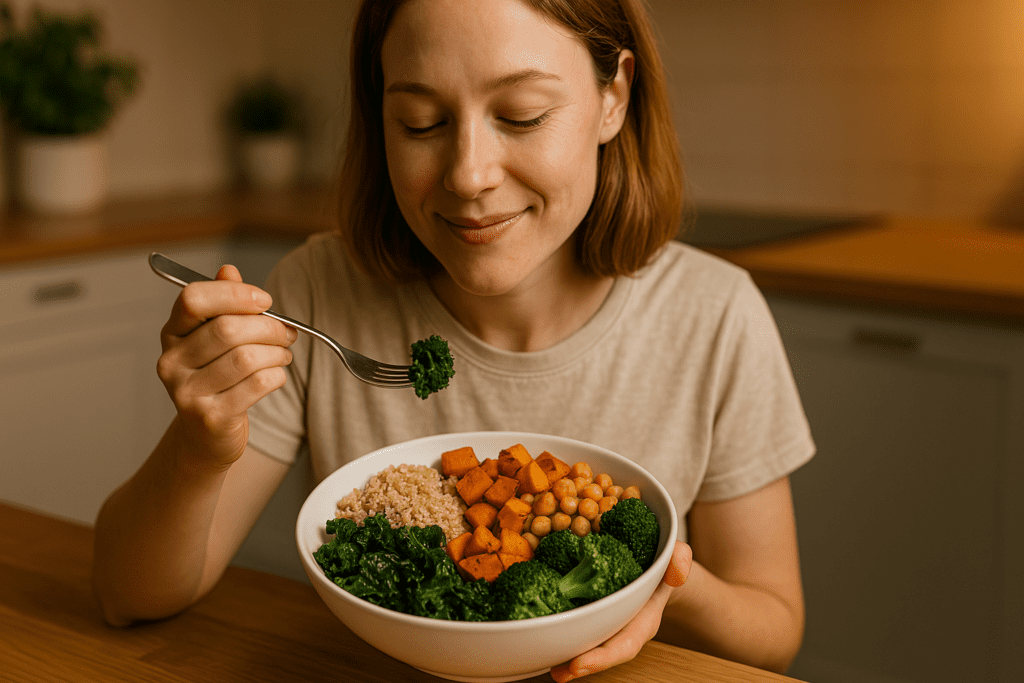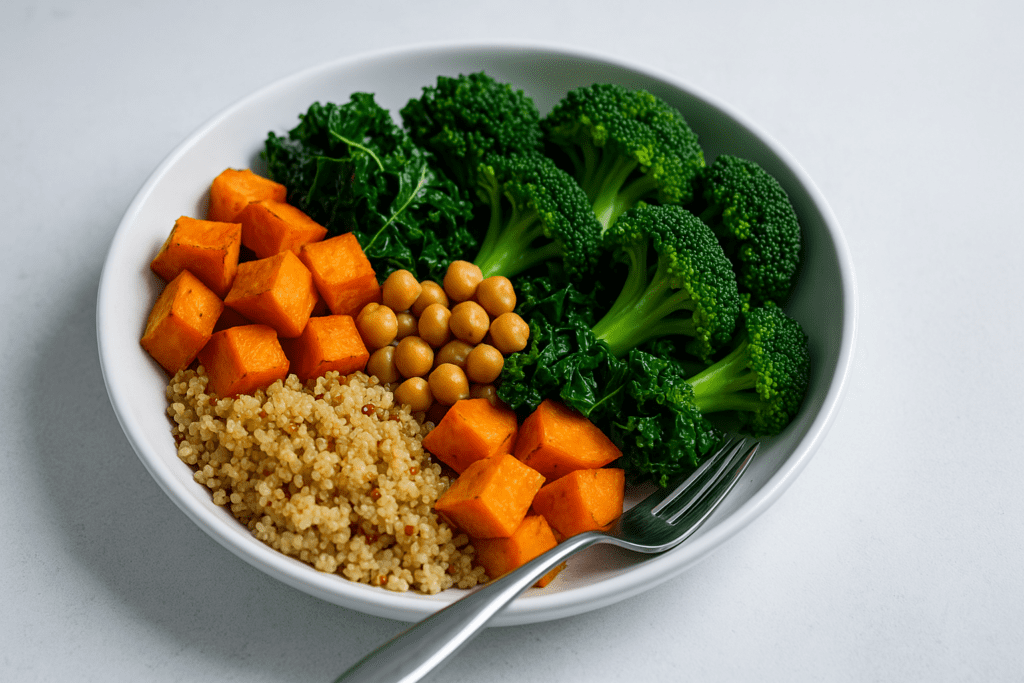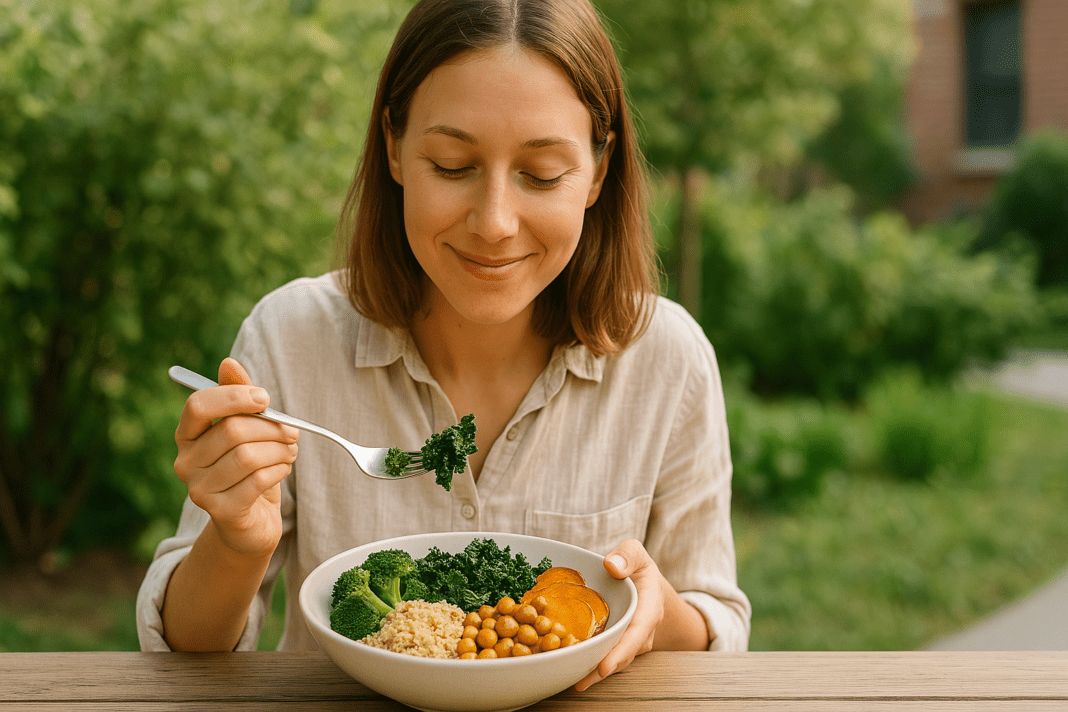Eating a nutritious dinner doesn’t have to be complicated or time-consuming, especially when you embrace the power of whole food plant-based recipes. With growing scientific support for the health benefits of plant-based meals, more people than ever are exploring plant forward recipes that nourish the body, support long-term wellness, and satisfy the taste buds. This shift toward a vegetable based diet is not only beneficial for personal health but also for the planet, aligning nutrition with environmental sustainability. Whether you’re a beginner just starting out or a seasoned plant-based eater looking for new inspiration, this guide offers expert insights and delicious ideas to make healthy plant-based dinners accessible, flavorful, and enjoyable every night of the week.
You may also like: The Only Diet Proven to Reverse Heart Disease: How Whole-Food, Plant-Based Nutrition Supports Lasting Heart Health
The Rise of the Plant-Based Movement and Why Dinner Matters Most
The surge in popularity of plant based diets is more than a fleeting trend; it reflects a deeper societal shift toward evidence-based nutrition and conscious eating. At the heart of this movement is the recognition that the foods we consume profoundly impact our physical health, mental clarity, and long-term disease prevention. Dinner, as the final major meal of the day, holds unique significance. It sets the tone for overnight metabolism, influences sleep quality, and contributes significantly to daily nutrient intake. For those exploring plant based dinner recipes, choosing whole food plant-based meals can provide a powerful nutritional boost while also offering culinary diversity and creativity.
Dinner is also the time when many individuals and families come together, making it a meaningful opportunity to foster connection and mindfulness around food. A well-composed plant based dinner doesn’t just deliver calories; it delivers nutrients, habits, and memories. Whether it’s a hearty lentil stew, a vibrant Buddha bowl, or a satisfying grain-and-veggie stir fry, plant based meals can be tailored to every cultural background and taste preference, helping make the transition to a plant based lifestyle feel effortless and inclusive.
What Makes a Whole Food Plant-Based Dinner Nutritionally Complete?
Creating whole food plant based diet recipes that are both satisfying and nutritionally balanced begins with understanding the fundamental components of a complete meal. A nourishing dinner typically includes a balance of macronutrients—complex carbohydrates, plant-based proteins, and healthy fats—along with ample fiber, vitamins, minerals, and phytonutrients. Unlike highly processed vegan options that can be low in essential nutrients, whole food plant-based recipes rely on minimally processed ingredients like legumes, whole grains, nuts, seeds, and vegetables in their most natural forms.
To ensure you’re meeting your nutritional needs with plant based dinners, it’s important to include a variety of food groups. Legumes such as black beans, lentils, and chickpeas offer high-quality plant protein and iron. Whole grains like quinoa, brown rice, and farro provide sustained energy and essential B vitamins. Vegetables—especially leafy greens and cruciferous types like broccoli, kale, and Brussels sprouts—deliver key antioxidants, fiber, calcium, and vitamin K. Adding healthy fats from avocados, tahini, or walnuts enhances nutrient absorption and satiety, making your meal more filling and enjoyable.
Nutrient diversity is the cornerstone of effective plant based meal planning. Rotating ingredients ensures that meals are rich in different phytonutrients and reduces the risk of deficiencies. For beginners, focusing on colorful plates filled with varied textures and flavors is a simple yet effective way to build plant based diet recipes that support long-term health and taste amazing.

Easy Plant-Based Recipes That Simplify Your Evening Routine
Ease and convenience are key factors in determining the sustainability of any dietary change, and plant based meals for beginners should prioritize simplicity without sacrificing nutrition. One of the great advantages of whole food plant-based dinners is their adaptability. Simple meals such as chickpea curry with spinach, quinoa-stuffed bell peppers, or sweet potato and black bean tacos can be prepared with minimal equipment and basic pantry staples. These easy plant based meals come together quickly while offering complex flavor profiles and high nutrient density.
Batch cooking is another strategy that enhances the ease of preparation. Preparing components like roasted vegetables, cooked grains, and pre-washed greens ahead of time allows for fast assembly of plant based dinner recipes throughout the week. This method supports a consistent, healthy eating pattern and minimizes the temptation to reach for less nutritious convenience foods.
Utilizing one-pot and sheet-pan methods can also streamline cleanup, which is often a barrier for people cooking at home. Recipes like lentil and vegetable stew, tofu stir fry, or a tempeh and broccoli bake deliver all the elements of a balanced dinner with minimal mess. With thoughtful planning and versatile ingredients, easy plant based recipes become the foundation for a practical, health-supportive lifestyle.
Inspiration for Plant-Based Menu Ideas That Don’t Feel Restrictive
One of the misconceptions about plant based diet ideas is that they can feel limiting or repetitive, but in reality, the diversity of whole plant foods offers nearly endless possibilities. Drawing inspiration from global cuisines can infuse your weekly menu with excitement and introduce you to new spices, textures, and cooking methods. For example, Mediterranean lentil pasta, Indian dal with basmati rice, Thai peanut tofu bowls, and Latin American-inspired black bean enchiladas are all nutrient-rich plant based dinner ideas that deliver both comfort and complexity.
Developing plant based menu ideas around themes—such as grain bowls, soups, or pasta nights—can help streamline weekly planning while leaving room for creativity. These structured themes also provide an easy framework for ensuring meals are balanced and satisfying. A grain bowl, for instance, might include a base of farro, roasted chickpeas, a medley of vegetables, and a drizzle of tahini-lemon dressing. Each element contributes to the flavor, nutritional value, and visual appeal of the dish.
Adding variety through seasonal produce not only supports local agriculture but also enhances the freshness and nutrient density of your meals. In spring, asparagus and peas can be featured in risottos and stir fries. In summer, ripe tomatoes and zucchini become the stars of grilled vegetable platters. Seasonal eating ensures that plant based diet recipes remain fresh and exciting, even when working with a basic repertoire of ingredients.
The Role of Whole Food Vegetable-Based Diet Recipes in Chronic Disease Prevention
Scientific literature continues to underscore the profound impact of a whole food vegetable based diet on long-term health outcomes. Diets rich in whole plant foods have been associated with reduced risk of heart disease, type 2 diabetes, certain cancers, and cognitive decline. The mechanisms behind these protective effects include high dietary fiber intake, improved gut microbiota composition, reduced inflammation, and enhanced insulin sensitivity.
Fiber, which is abundant in plant based dinners made with legumes, vegetables, and whole grains, plays a crucial role in regulating blood sugar levels, supporting digestion, and maintaining a healthy weight. Additionally, the high antioxidant content of colorful vegetables helps neutralize oxidative stress, which is implicated in the progression of many chronic conditions. Consuming plant based meals regularly helps lower LDL cholesterol, reduce blood pressure, and support vascular health.
The inclusion of whole food plant based diet recipes as part of a daily routine has been particularly beneficial in lifestyle intervention studies, such as the Ornish and Pritikin programs. These research-backed approaches demonstrate that a consistent plant-based dietary pattern can not only halt but, in some cases, reverse the progression of disease. This compelling evidence underscores the value of plant forward recipes in preventative healthcare and highlights the importance of integrating such meals into dinner planning.
Best Plant-Based Recipes That Balance Flavor, Texture, and Nutrition
Achieving balance in plant based meal recipes requires more than just assembling healthy ingredients—it involves attention to flavor layering, textural contrast, and visual appeal. A well-composed meal satisfies the senses as well as the stomach. For example, pairing roasted root vegetables with a tangy balsamic glaze, toasted walnuts, and a creamy hummus base creates a multidimensional dish that feels indulgent but is grounded in whole foods.
Plant based dinners can also benefit from fermentation and umami-rich elements, which deepen the complexity of flavor. Incorporating ingredients like miso, nutritional yeast, sauerkraut, tamari, or sun-dried tomatoes elevates otherwise simple meals. These components contribute savory depth and often provide additional probiotics or micronutrients, enhancing the nutritional profile of the dish.
Cooking techniques matter, too. Roasting, sautéing, and grilling can caramelize vegetables and bring out their natural sweetness, while marinating tofu or tempeh adds depth and tenderness. For plant based recipes for beginners, starting with simple techniques and gradually exploring more adventurous preparations encourages confidence and skill development in the kitchen.
Plant-Based Dinner Recipes for Beginners That Build Culinary Confidence
Transitioning to a plant based diet can feel overwhelming at first, which is why accessible, foolproof recipes are essential. Beginners benefit from meals that use familiar ingredients in new ways, reducing the learning curve while delivering delicious results. Dishes such as vegetable stir fries with brown rice, baked sweet potatoes topped with black beans and salsa, or simple pasta with sautéed greens and garlic are approachable options that require minimal cooking experience.
Learning to prepare a few foundational sauces—like cashew cream, tahini dressing, or tomato lentil marinara—can dramatically expand the versatility of plant based meal ideas. These sauces can be used across different recipes, adding richness, moisture, and flavor. As confidence grows, beginners can experiment with more complex preparations like homemade veggie burgers, stuffed squash, or cauliflower curry.
The key to building long-term habits is enjoyment. When healthy plant based recipes are satisfying and enjoyable, adherence becomes effortless. Encouraging creativity and personalization—through toppings, herbs, or spice blends—helps beginners feel invested in the process. With practice and patience, even novice cooks can find joy and confidence in preparing wholesome, plant based dinners that align with their health goals.
Why Whole Food Plant-Based Meals Support Sustainable Living
Beyond personal health, whole food plant based meals align with broader sustainability goals, making them an ethical and environmentally responsible choice. Research consistently shows that plant-based diets have a lower environmental impact compared to diets high in animal products. They require fewer natural resources, produce less greenhouse gas emissions, and contribute to biodiversity conservation.
By focusing on whole food vegetable based diet recipes, individuals can reduce their carbon footprint while supporting regenerative agriculture and local food systems. Choosing legumes over meat, for example, significantly decreases water usage and land degradation. Additionally, eating in harmony with seasonal and local availability minimizes transportation emissions and packaging waste.
Adopting a plant forward diet also encourages a deeper awareness of food sourcing and consumption habits. Meal planning, food storage, and waste reduction strategies become integral to the lifestyle, reinforcing a sense of connection and responsibility toward the environment. In this way, plant based diet dinner ideas serve as a gateway to more conscious and sustainable living.
Redefining Comfort Food with the Best Plant-Based Meals
Comfort food often conjures images of rich, indulgent dishes, but these flavors can be recreated with nourishing, plant based ingredients. Comfort doesn’t have to come at the expense of health. In fact, the best plant based meals can evoke a sense of satisfaction and nostalgia while delivering high-quality nutrition. Think of lentil shepherd’s pie, mushroom stroganoff, or creamy coconut curry—all warm, grounding meals that are completely plant-based and packed with flavor.
Texture is a crucial component of comfort. Using ingredients like mashed legumes, roasted vegetables, and whole grains creates hearty, satisfying bites. Layering spices, herbs, and plant-based fats adds richness that makes meals feel complete. These healthy plant based recipes often exceed expectations, especially when served with thoughtful garnishes and sides, like a crisp salad with lemon vinaigrette or a slice of whole grain sourdough.
The psychological component of food should not be overlooked. Plant based dinners that are lovingly prepared and shared can provide the same emotional resonance as traditional comfort foods, especially when infused with intention and care. Redefining comfort through a plant-based lens allows individuals to enjoy familiar rituals while supporting long-term health.
Embracing Plant-Based Dinner Ideas as a Long-Term Lifestyle
Building a consistent routine around plant based dinners requires intentionality, curiosity, and a willingness to experiment. Over time, what begins as a dietary change evolves into a lifestyle that prioritizes nourishment, sustainability, and mindfulness. Developing weekly rituals, such as Sunday meal prep or themed dinner nights, fosters structure while leaving room for creativity. This consistency makes it easier to stick to healthy habits and explore new plant based diet recipes without decision fatigue.
Community and connection also play a pivotal role in sustaining a plant based lifestyle. Sharing meals with friends and family, participating in local cooking classes, or joining online recipe groups can offer encouragement and inspiration. As more people embrace plant based meals, social support and access to resources become more abundant, making the transition smoother for newcomers.
Ultimately, the goal is not perfection but progress. Incorporating more whole food plant based meals into your diet—even gradually—can lead to measurable improvements in health, energy, and well-being. The beauty of this approach lies in its flexibility and inclusivity, accommodating diverse preferences, dietary needs, and cultural traditions.

Frequently Asked Questions: Healthy Plant-Based Dinners and Whole Food Recipes
1. How can I avoid common mistakes when starting with plant based meals for beginners?
Many beginners make the mistake of relying too heavily on packaged vegan products or omitting key nutrients like protein and iron. To get the most from plant based meals for beginners, focus on building your plate with whole foods rather than substitutes. Include legumes, whole grains, nuts, seeds, and a variety of colorful vegetables to ensure balance and variety. Experimenting with easy plant based recipes at home helps you avoid overly processed convenience items while developing your own culinary skills. Incorporating simple plant based dinner recipes, such as lentil tacos or stir-fried tofu and vegetables, can help ease the transition without compromising on nutrition or flavor.
2. What are some strategies for creating satisfying plant based dinners that don’t leave me hungry?
The key to creating filling plant based dinners lies in combining fiber-rich carbohydrates with adequate protein and healthy fats. For instance, vegetable based diet recipes that pair sweet potatoes with chickpeas and tahini dressing provide long-lasting satiety due to their high nutrient density. Avoid meals that are too light or lack variety; instead, include hearty components like roasted vegetables, quinoa, and avocado. You can also enhance fullness by starting meals with a small salad or vegetable soup. Over time, experimenting with whole food plant based meals helps identify combinations that truly satisfy your appetite and energy needs.
3. How can I meal prep whole food plant based recipes for a busy week?
Meal prepping plant based diet recipes doesn’t have to be complicated. Start by choosing two to three foundational plant based meal recipes that you can batch cook—such as lentil stews, roasted veggie quinoa bowls, or baked tofu. These recipes store well and can be repurposed throughout the week with different sauces, herbs, or toppings to prevent boredom. Incorporating plant based menu ideas like grain bases and bean mixes lets you build varied dinners in minutes. When prepared mindfully, whole food plant based diet recipes save time, reduce stress, and support consistent healthy eating habits.
4. What are the best plant based recipes for colder seasons when fresh produce is limited?
Seasonal constraints offer an excellent opportunity to lean into warming, hearty meals. Some of the best plant based recipes for winter feature pantry staples like lentils, canned tomatoes, root vegetables, and whole grains. Think stews, chilis, casseroles, and curries—all ideal formats for whole food vegetable based diet recipes. These dishes are not only comforting but also nutrient-rich, especially when seasoned with warming spices like cumin, turmeric, and smoked paprika. Emphasizing plant forward recipes during colder months fosters creativity and ensures year-round enjoyment of plant based dinners.
5. How can I introduce plant based meals to family members who are skeptical about changing their diet?
Introducing plant based dinner ideas to family members can be easier when you focus on flavor, familiarity, and presentation. Start by preparing plant based dinners that resemble popular comfort foods—such as spaghetti with lentil marinara or vegan enchiladas with cashew cream. By highlighting taste and texture, you shift the focus away from what’s missing and toward what’s satisfying. Involving others in the meal preparation process also creates engagement and openness. Over time, exposing your household to the best plant based meals with vibrant flavor profiles can shift perceptions and foster curiosity.
6. What kitchen tools help streamline making plant based dinner recipes for beginners?
Investing in a few key kitchen tools can transform the ease and enjoyment of cooking plant based diet recipes for beginners. A high-quality blender is invaluable for making sauces, dressings, and creamy soups. A sharp chef’s knife and cutting board make vegetable prep faster and safer. Pressure cookers or multi-cookers reduce cooking time for legumes and whole grains, essential in many wfpb recipes. Nonstick skillets and sheet pans also support efficient cooking and cleanup for weeknight meals. With the right tools, even the most complex whole food plant based meals become approachable and fun to prepare.
7. Are there specific ingredients that enhance flavor in plant based meal recipes without adding processed foods?
Absolutely. Flavor development in plant based meal recipes doesn’t require artificial enhancers. Umami-rich ingredients like mushrooms, miso paste, nutritional yeast, and sun-dried tomatoes add depth to soups, stews, and sauces. Acidic elements like lemon juice or vinegar brighten dishes and balance richness. Toasted nuts and seeds add crunch, while fresh herbs elevate any plant based dinner. These additions help transform even easy plant based meals into gourmet experiences. By building layers of flavor, you’ll never miss the salt, sugar, or fat typically found in processed foods.
8. How do I maintain variety in my plant based diet dinner ideas without feeling overwhelmed?
Rotating a few flexible templates is the best strategy for variety without complication. For example, you might alternate between grain bowls, tacos, stir-fries, and soups—each using different vegetables, proteins, and seasonings. Whole food plant based recipes are highly adaptable, allowing you to switch up components while keeping preparation efficient. Try dedicating a night each week to exploring international plant based diet ideas, such as Thai curry, Ethiopian lentils, or Mediterranean mezze. With just a bit of structure, plant based menu ideas become exciting rather than exhausting.
9. What are some overlooked sources of protein in whole food plant based diet recipes?
Beyond beans and tofu, many lesser-known ingredients provide quality protein for plant based meals. Green peas, hemp seeds, and quinoa are excellent examples of complete protein sources that support muscle repair and satiety. Nutritional yeast not only adds a cheesy flavor to plant based recipes but also contributes protein and B vitamins. Tempeh, which is made from fermented soybeans, has a higher protein content and improved digestibility compared to tofu. Exploring these ingredients expands the range of healthy plant based recipes and ensures your meals are well-rounded and nutritionally robust.
10. What mindset shifts support long-term success with a vegetable based diet?
Sustainable success with a vegetable based diet often starts with reframing the transition as a journey rather than a quick fix. Rather than focusing on restriction, embrace the abundance of plant based diet dinner ideas that celebrate diverse ingredients and flavors. It helps to view each meal as an opportunity to experiment and learn, rather than aiming for perfection. Building a repertoire of go-to plant based dinner recipes for beginners creates a sense of routine and comfort. Ultimately, the most rewarding plant based meals come from a mindset rooted in curiosity, flexibility, and joy—not just rules or trends.

A Nourishing Future Starts at the Dinner Table
Healthy plant-based dinners are more than just a trend—they represent a return to food that supports the body, the planet, and the communities we share it with. By embracing whole food plant based recipes, individuals empower themselves with the tools to make nourishing, sustainable choices that resonate far beyond the plate. Whether you’re seeking easy plant based meals, experimenting with new plant based dinner recipes, or looking to elevate your culinary repertoire with the best plant based recipes available, the possibilities are endless and deeply rewarding.
Through thoughtful planning, diverse ingredients, and a spirit of exploration, plant based dinners can become a cornerstone of vibrant living. For beginners and experienced cooks alike, the transition toward a vegetable based diet offers an opportunity to reconnect with food, enhance well-being, and cultivate a lifestyle rooted in health and compassion. When dinner is delicious, balanced, and intentional, every bite becomes a step toward a healthier, more sustainable future.
Further Reading:
WHOLE-FOOD, PLANT-BASED (WFPB) RECIPES FROM FORKS OVER KNIVES
Ten easy plant-based recipes for beginners
plant-based cooking tips, vegan dinner ideas, healthy vegan meals, whole food nutrition, plant-powered eating, beginner vegan meals, sustainable eating habits, clean eating dinners, plant-based protein sources, seasonal vegan recipes, vegan comfort food, plant-based lifestyle, nutrient-dense meals, healthy meal planning, plant-based grocery list, eco-friendly diet, fiber-rich dinners, anti-inflammatory meals, heart-healthy eating, balanced vegan nutrition
The information contained in this article is provided for general informational purposes only and is not intended to serve as medical, legal, or professional advice. While NewsHealthWatch strives to present accurate, up-to-date, and reliable content, no warranty or guarantee, expressed or implied, is made regarding the completeness, accuracy, or adequacy of the information provided. Readers are strongly advised to seek the guidance of a qualified healthcare provider or other relevant professionals before acting on any information contained in this article. NewsHealthWatch, its authors, editors, and contributors expressly disclaim any liability for any damages, losses, or consequences arising directly or indirectly from the use, interpretation, or reliance on any information presented herein. The views and opinions expressed in this article are those of the author(s) and do not necessarily reflect the official policies or positions of NewsHealthWatch.

